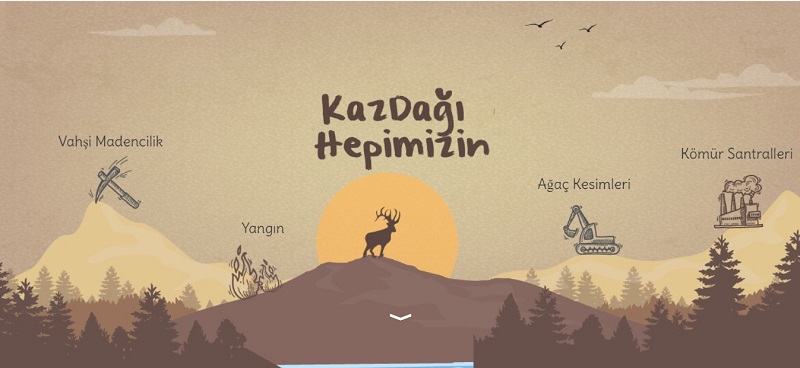Ecological Struggles in Kazdağları: “They Used to Describe Us as Romantic Ecologists; Now We are Accused of Vandalism”

The Kazdağları mountains in Turkey are home to an ecological struggle which goes way beyond the limits of the local arena. One of the foremost figures in this struggle is Süheyla Doğan, Chairperson of Kazdağları Natural and Cultural Heritage Preservation Association and Co-Chair of Ecological Union, who states that the ecological struggle is becoming increasingly visible; however, public agencies are adopting a harsher approach: "They used to describe us as romantic ecologists; now we are accused of vandalism."
Why do you take part in the ecological struggle for Kazdağları?
I want to protect the region I live in. I do not want this place to be polluted, destroyed or poisoned. Such damage to the region would harm my health, my relatives’ and neighbors’ well-being, and destroy the entire ecosystem. My objective is to keep this area clean and to help all living beings thrive in a healthy environment.
How did you proceed in Kazdağları? Which methods did you opt for? Did you try the legal methods as well?
In 2007, we formed the Kazdağı Conservation Initiative Group to stand against a gold mine planned in the region. We provided information to the locals and villagers. We held village meetings, panel discussion, and demonstrations. We organized petition campaigns. We conducted lobbying activities. We managed to stop the project at the drilling phase. When we came to realize that similar mining and energy projects were planned for all over Kazdağları, we decided to set up an association for a more extensive struggle, and thus in 2012, we established Natural and Cultural Heritage Preservation Association.
Our fields and topics of struggle have diversified in time. We are currently involved in struggles against gold mining, thermal power plants, dams, geothermal power plants and wind power plants planned for unsuitable locations. We are active in the field, in villages, in lobbying, across social media platforms; and we also keep track of the Environmental Impact Assessment processes and conduct a legal struggle. We employ every means available.
Aside from struggling against energy and mining projects set to bring about ecological destruction, we also organize talks, workshops and festivals on ecological practices to build a more ecological lifestyle.
Do you feel you make progress? Have you observed changes over the years?
As the effects of the climate crisis are increasingly felt, the struggle for ecology has started to gain more proponents. The struggle has became more visible. Over the years, we have gained experience and now have contacts with more people and institutions. Everyone is an environmentalist now (!).
What is the attitude of public agencies and security forces towards the local environmental movement? How does their attitude affect you?
Their attitude is getting worse and worse. The level of violence is on the rise. They impose fines. They used to describe us as romantic ecologists; now we are accused of vandalism. It is becoming very hard to establish collaboration between institutions. Our demands are ignored. Although these attitudes make our job difficult, we do not give up.
Can you reach beyond the local level to make your voice heard at the national level and receive support?
We are organized at the national level. We have established the Ecology Union to combine our struggles. We support each other. We are trying to raise our voices together. Our biggest support comes from each other.
Since we are constantly under assault, we are in a more defensive position. It becomes difficult to impose our own agendas and demands.
What is the impact of the political juncture and politicians’ approach? How would you describe political parties’ attitude and support?
The political juncture and the attitudes of pro-government politicians have a direct effect on us. These shape our fields and modes of activity. We cannot exercise our democratic rights owing to bans and restrictive regulations. We mainly entertain relations with opposition parties at the local and national level. They join in and give support to our actions. They also offer support by submitting parliamentary questions. Such political parties now establish ecological branches and show more interest to this issue.
Young individuals are not so active in environmental movements and groups. Women are at the forefront of the struggle, yet there are very few women in decision-making mechanisms in environmental movements and groups. We lack creativity and innovative methods. There is also a lack of knowledge and experience.
What in your opinion would yield favorable results? What do you need in this respect?
We can achieve success only through a united struggle involving all segments of society, especially youth and women. There is need for creative ideas. We can getter better results if a political force that attaches importance to the ecological system and will not allow ecological destruction rises to power.

Bizi Takip Edin